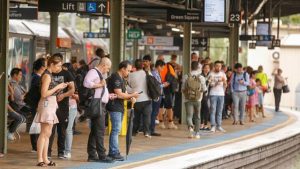Home » Commentary » Opinion » We’re more united about immigration than we think
· The Daily Telegraph

 The renewed debate about Australia’s immigration program raises vital questions about the political and social cohesiveness of our nation.
The renewed debate about Australia’s immigration program raises vital questions about the political and social cohesiveness of our nation.
New South Wales Premier Gladys Berejiklian has announced an expert panel to assess the current rate of immigration into NSW — citing congestion and an infrastructure deficit as the main reasons.
NSW Treasurer Dominic Perrottet has been critical of the federal government’s handling of immigration, saying that “merely adding more people isn’t a sustainable economic strategy.” Perrottet went on to discuss how high rates of immigration impact wages, house prices, and the quality of our infrastructure: “…we can’t pretend that high immigration comes without a cost…”
Given the pressures an increasing population puts on key infrastructure like transport, hospitals and schools, it is little wonder immigration issues have also featured in campaigning for the Victorian election due this Saturday.
Opposition leader Matthew Guy has promised a Liberal government would establish a population commission to advise on immigration levels and the adequacy of local infrastructure to accommodate population growth.
At best, some have criticised these moves as political opportunism — and at worst as capitulating to anti-immigrant sentiments.
Concerns over immigration have been blamed for recent international political disturbances such as Brexit, Trumpism, and the rise of populist parties across Europe that appeal to lower income groups but are largely shunned by wealthier ‘elites’.
Some commentators believe we are seeing a similar division here. But polling conducted across the poorest and wealthiest metropolitan postcodes as part of Centre for Independent Studies research shows we are overwhelmingly more united than divided on immigration.
A near majority in the 500 people polled in the highest decile postcodes (46 per cent) and a majority of the 500 polled in the lowest ones (57 per cent) believe current levels of immigration are ‘too high’. But more importantly, the overwhelming majority of those — 65 per cent in the highest and 77 per cent in the lowest — believe immigration should be cut or paused until critical infrastructure has caught up.
While support for reviewing immigration is strongest in the lowest decile postcodes, this does not necessarily mean Australians are fracturing over the issue.
Rather, the results suggest that the more direct experience people have with immigration — given that the affordable suburbs are often more heavily impacted by immigration’s effect on population pressure, roads, public transport, schools and hospitals — the stronger is their support for cuts.
But the point remains that the vast majority in both ‘rich’ and ‘poor’ suburbs believe we should be reducing immigration until infrastructure catches up with population pressures.
This consensus makes sense when you think about the impact of population pressures in our major cities in which the majority of migrants settle.
In Sydney, urban congestion impacts on quality of life on residents across the city — regardless of whether they live in Penrith or Point Piper — due to factors such as longer commutes to work by car or not finding a seat on the train.
Our polling also shows that Australians are more united than divided on the crucial question of integrating migrants.
Australia has had a proud and enviable record of harmoniously integrating migrants, irrespective of background, since the end of World War 2.
Public support for immigration has been buoyed by the expectation immigrants fully participate in Australian life and support key Australian values — such as a parliamentary democracy, rule of law, and individual liberty.
Our polling indicates widespread support for a more active and formal approach to facilitate integration: 75 per cent of those in the most affluent postcodes and 82 per cent of those in the least affluent believe migrants should learn about Australian values.
Moreover, a clear majority — 80 per cent from the highest and 86 per cent from the lowest decile postcodes — believe migrants should have a minimum standard of English.
Even on the most contentious immigration related issue, border protection, there was more unity than disunity. Majorities in both — 58 per cent in the top and 67 per cent in the bottom postcodes — believe, regardless of whoever wins the next election the strong border protection policies introduced by the federal government in 2014 should remain in place.
These results have major implications for the debate about immigration.
Clearly, critics who argue that politicians who want to cut immigration or promote integration are pandering to fringe (or worse) views are mistaken.
Our polling suggests such politicians are responding to concerns about immigration shared across the social spectrum; and are actually reflecting mainstream attitudes.
What critics don’t understand is that for immigration to enjoy public support — and thus be politically sustainable — politicians must respond to public concerns about issues such as congestion and cohesion.
Far from caving in to anti-immigration sentiments, politicians who address these concerns are actually laying the foundations for the continued support and success of Australia’s proud immigration record.
Monica Wilkie is a Policy Analyst in the Culture, Prosperity and Civil Society Program at The Centre for Independent Studies. Her report, co-authored with Dr Jeremy Sammut, ‘Australian Attitudes to Immigration: Coming Apart or Common Ground?’ was released on Monday, 19 November 2018.
We’re more united about immigration than we think